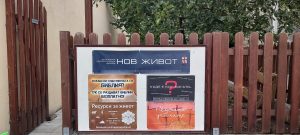We build up disciples, found churches and further the Kingdom.
About Pastor
Josh Provow, together with his five kids, have lived in Bulgaria since July 1, 2015. For almost three years the Provow family lived in the city of Svishtov and served in Bulgarian Protestant Church New Life in Svishtov alongside pastor Tim Awtrey. In 2018 they moved to the city of Shumen
The pastor’s favorite verse:
“Though the fig tree should not blossom, nor fruit be on the vines, the produce of the olive fail and the fields yield no food, the flock be cut off from the fold and there be no herd in the stalls, yet I will rejoice in the Lord; I will take joy in the God of my salvation.” -Habakkuk 3:17-18
What do I like?
- Catan (a strategy board game)
- walks up on the Shumen Plateau
- industrial quantities of coffee
- playing Nintendo with the kids
- baseball
- Star Wars
- homemade banitsa
- eating his daughter’s culinary masterpieces
- talking to people about the Bible and Jesus
- taking part in our weekly worship services
My dream
- my kids to grow up loving Jesus
- to live out the aforementioned verses and to rejoice in the Lord and in whatever He has for him
- to establish healthy churches throughout the Shumen Province and for that churches in turn to establish other churches
Connect with Josh on Facebook.
-
Mission
God is not just a power or energy. He is a triune personal God. If this is true it should change completely the way we think and live. In Bulgarian Protestant Church “New Life” we believe that God exists and that He has revealed Himself to us through creation, the Biblical revelation and the incarnation of God’s Son Jesus Christ.
We love Bulgaria and want to know more about its history, care for its present and work for its better future. That’s why at our gatherings we learn to better obey God, love our neighbor and serve our motherland.
We believe that only faith in God’s Son Jesus Christ can give hope to our compatriots for overcoming the hard political, economic and spiritual crisis. Only the spiritual revival can take our nation to a new awakening so that she could come regain its noble position in the family of European nations.
We invite you to an exciting adventure with us – come and get to know more of this incredible God and take part in the work of renewal of Bulgaria.
-
Purpose statement of New Life:
We build up disciples, found churches and further the Kingdom.
-
DOCTRINAL STATEMENT
We believe…
- God is the Creator, Sustainer, and Righteous Ruler of the universe. He has revealed Himself in nature, and in the Scriptures of the Holy Bible as Father, Son, and Holy Spirit: yet as one God.
- Jesus Christ – He is God’s unique Son; the only one of a kind. The Scripture teaches that He is God revealed in flesh. In His Divine nature He is truly God and in His human nature truly man. He is the One once crucified for man’s sin, the now risen and glorified Savior and Lord who mediates between God and man and who gives us access to the Father through His intercession. None can come to the Father unless they come through Him.
- Holy Spirit – All of the attributes of God are ascribed to the Holy Spirit by the Scriptures. It is He who convicts and convinces men of their sin. He also convinces man of that which is right, and that a final day of judgment will come. He, it is, who comes to live in us at conversion, to open our understanding to the Scripture, and to lead us into the truth.
- The Bible – God used holy men to write the Scriptures. They are, in both the Old and New Testaments, the very words God intended us to have. They are, as given by God, without error and are our only rule of faith and practice. We profit from them by learning the truth about many things: they also speak to us about wrong doing; they even correct us and get us back on course as well as instructing us in right living.
- Man – God created man in a state of innocence. Man, being tempted by Satan, yielded and willfully disobeyed God, becoming a sinner and incurring God’s judgment upon sin. All of Adam’s descendants inherit his fallen nature and thus have a natural inclination to sin. When one comes to an age of accountability, he is guilty of sinning before God and in need of salvation.
- God’s Relationship to His Creatures and Creation – God exercises a wise and benevolent providence over all beings and things. He maintains the laws of nature and performs special acts as the highest welfare of mankind and His created order of things require.
- Salvation – Man receives pardon and forgiveness for his sins when he admits to God that he is a sinner, when in godly sorrow he turns from them and trusts in the work of Christ as redemption for his sin. This acceptance of God’s great salvation involves belief in Christ’s death on the cross as man’s substitute and the fact of God’s raising Him from the dead as predicted. It is a salvation by grace alone and not of works.
- Who Can be Saved? – It is God’s will that all be saved, but since man has the power of choice, God saves only those who repent of their sin and believe in the work of Christ on the cross. Those who refuse in this life to repent and believe have no later chance to be saved and thus condemn themselves to eternal damnation by their unbelief.
- Perseverance – We believe that there are strong grounds to hope that the saved will persevere unto the end and be saved because of the power of divine grace pledged for their support. We believe that any saved person who has sinned (whether we call him a backslider or sinner), but has a desire to repent, may do so and be restored to God’s favor and fellowship. Since man, however, continues to have free choice, it is possible because of temptations and the weakness of human flesh for him to fall into the practice of sin and to make shipwreck of his faith and be lost.
- Gospel Ordinances – We believe the Bible teaches two ordinances for the church to practice: Baptism in water by immersion and the Lord’s Supper, to be perpetuated until His return.
- Resurrection – We believe the Scriptures teach the resurrection of the bodies of all men, each in its own order; they that have done good will come forth to the resurrection of life, and they that have done evil to the resurrection of damnation.
- Christ’s Second Coming – The Bible teaches that Jesus Christ, who ascended on high and sits at the right hand of God, will come again to close the Gospel dispensation, glorify His saints, and judge the world.
- Missions – We believe that Jesus commanded the church to go into all the world and preach the Gospel to every creature.
-
History of Free Will Baptists and Bulgarian Protestant Church “New Life”The name “Free Will Baptists” is used for the first time even the 60s of the 17th century in England to denote baptists who called themselves ‘freewillers’. The name was a term of derision referring to our conviction that every person has free will to accept or reject God.
Colonial Roots
Free Will Baptists sprang up on two fronts in Colonial America. The southern line, or Palmer movement, traces its beginnings to the year 1727 when Paul Palmer organized a church at Chowan, North Carolina.
The northern line, or Randall movement, had its beginnings with a congregation organized by Benjamin Randall June 30, 1780, in New Durham, New Hampshire. Both lines of Free Will Baptists taught the doctrines of free grace, free salvation, and free will, although from the first there was no organizational connection between them.
The northern line expanded more rapidly in the beginning and extended its outreach into the West and Southwest. In 1910-1911 this body of Free Will Baptists merged with the Northern Baptist denomination, taking along the great majority of its 1,100 churches and all denominational property, including several major colleges. In 1916, a broad Cooperative General Association was formed at Pattonsburg, Missouri. The new association included delegates from the Randallite churches that had resisted the merger, while others owed their origins to the Palmer movement.
Free Will Baptists in the southeastern United States, having descended from the Palmer foundation, often manifested fraternal relationships with Free Will Baptists of the Randall movement in the north and west, but the slavery question and the Civil War prevented formal union between them. The churches in the southern line were organized into various associations and conferences from the beginning and finally organized into a General Conference by 1921. These congregations were unaffected by the merger of the northern movement with the Northern Baptists.
A New Movement
It was inevitable that a fusion between the Cooperative General Association and the General Conference of Free Will Baptists would finally come. In Nashville, Tennessee, on November 5, 1935, representatives from the two bodies met and organized the National Association of Free Will Baptists.
The new body adopted a Treatise, which set forth basic doctrines and described the faith and practice that had characterized Free Will Baptists through the years. After being revised on several occasions, this document continues to serve as a guideline for a denominational fellowship comprising more than 2,400 churches in 42 states and 14 foreign countries.
“New Life” in Bulgaria
The first New Life Church in Bulgaria, as part of the Free Will Baptist Movement, was founded in the town of Svishtov in 2011 by pastor Timothy & Lydia Awtrey, missionaries of the denomination. In 2013 there came the family of Jonathan and Amy Postlewaite who began their ministry in Svishtov and are now planting a church in Pleven. The same year Trif and Vanya Trifonovs founded a New Life Church in Varna.
The new denomination was registered on September 10th 2014. In 2015 the Josh Provow family arrived in Svishtov. The Provows have planted a church in Shumen and dream of the day when the church will have a Bulgarian pastor.
Used with permission from Free Will Baptist History.
Connect with us
BPC New Life Shumen
5 Petyr Karjiev Str.
pastor Josh Provow
tel. 0879638556
email: newlifeshumen@gmail.com




